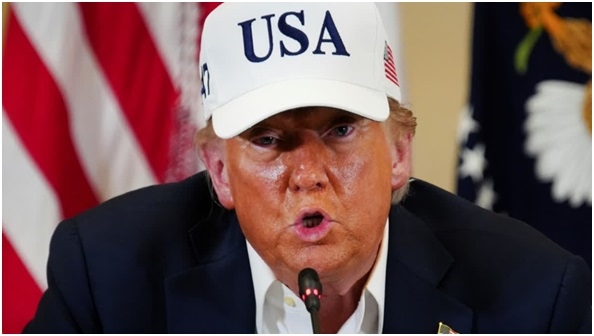Major US Trading Partners Rattled As Trump Announces 30% Tariffs Against EU, Mexico To Begin Aug 1
16 Jul 2025 14:54:23

Bridgewater :
President Donald Trump on Saturday announced he's levying
tariffs of 30% against the European Union and Mexico starting Aug. 1, a move
that could cause massive upheaval between the United States and two of its
biggest trade partners.
Trump detailed the planned tariffs in letters posted to his social media
account. They are part of an announcement blitz by Trump of new tariffs aimed
at allies and foes alike, a bedrock of his 2024 campaign that he said would set
the foundation for reviving a U.S. economy that he claims has been ripped off
by other nations for decades.
In his letter to Mexico's leader, President Claudia Sheinbaum, Trump
acknowledged that the country has been helpful in stemming the flow of
undocumented migrants and fentanyl into the United States. But he said the
country has not done enough to stop North America from turning into a
“Narco-Trafficking Playground.”
“Mexico has been helping me secure the border, BUT, what Mexico has done,
is not enough,” Trump added. Trump in his letter to the European Union said the
U.S. trade deficit was a national security threat.
"We have had years to discuss our Trading Relationship with The
European Union, and we have concluded we must move away from these long-term,
large, and persistent, Trade Deficits, engendered by your Tariff, and
Non-Tariff, Policies, and Trade Barriers,” Trump wrote in the letter to the EU.
“Our relationship has been, unfortunately, far from Reciprocal.”
The letters come in the midst of an on-and-off Trump threat to impose
tariffs on countries and right an imbalance in trade. Trump in April imposed
tariffs on dozens of countries, before pausing them for 90 days to negotiate
individual deals. As the three-month grace period ended this week, Trump began
sending his tariff letters to leaders but again has pushed back the
implementation day for what he says will be just a few more weeks.
If he moves forward with the tariffs, it could have ramifications for
nearly every aspect of the global economy.
EU members and Mexico respond
European Union Commission President Ursula von der Leyen responded by
noting the bloc's “commitment to dialogue, stability, and a constructive
transatlantic partnership.”
“At the same time, we will take all necessary steps to safeguard EU
interests, including the adoption of proportionate countermeasures if
required,” von der Leyen said in a statement.
Von der Leyen added that the EU remains committed to continuing
negotiations with the U.S. and coming to an agreement before Aug. 1. Trade
ministers from EU countries are scheduled to meet Monday to discuss trade
relations with the U.S., as well as with China. European leaders joined von der
Leyen in urging Trump to give negotiations more time and warnings of possible
new tariffs on Washington.
“With European unity, it is more than ever up to the Commission to assert
the Union’s determination to resolutely defend European interests,” French
President Emmanuel Macron said in a statement posted on X.
Italian Premier Giorgia Meloni’s office said "it would make no sense
to trigger a trade war between the two sides of the Atlantic." Danish
Foreign Minister Lars Løkke Rasmussen told broadcaster DR that Trump was taking
a “pointless and a very shortsighted approach." Swedish Prime Minister Ulf
Kristersson warned in an interview with SVT that “everyone loses out from an
escalated trade conflict, and it will be U.S. consumers who pay the highest
price.”
Trump, as he has in previous letters, warned that his administration
would further raise tariffs if the EU attempts to hike its own tariffs on the
United States. The Mexican government said it was informed during high-level
talks with U.S. State Department officials Friday that the Trump letter was
coming.
The delegation told Trump officials at the meeting it disagreed with
the decision and considered it “unfair treatment,” according to a Mexican
government statement.
Sheinbaum, who has sought to avoid directly criticizing Trump in the
early going of her presidency, expressed a measure of confidence during a
public appearance on Saturday that the U.S. and Mexico will reach “better
terms.” “I’ve always said that in these cases, you need a cool head to face any
problem,” Sheinbaum said.
With the reciprocal tariffs, Trump is effectively blowing up the rules
governing world trade. For decades, the United States and most other countries
abided by tariff rates set through a series of complex negotiations known as
the Uruguay round. Countries could set their own tariffs, but under the “most
favored nation’’ approach, they couldn’t charge one country more than they
charged another.
The Mexico tariff, if it goes into effect, could replace the 25% tariffs
on Mexican goods that do not comply with the existing U.S.-Mexico-Canada free
trade agreement. Trump’s letter did not address if USMCA-compliant goods would
still be exempt from the Mexico tariffs after Aug. 1, as the White House said
would be the case with Canada. Trump sent a letter to Canada earlier this week
threatening a 35% tariff hike.
Higher tariffs had been suspended
With Saturday's letters, Trump has now issued tariff conditions on 24
countries and the 27-member European Union. So far, the tally of trade deals
struck by Trump stands at two — one with the United Kingdom and one with
Vietnam. Trump has also announced the framework for a deal with China, the
details of which remain fuzzy.